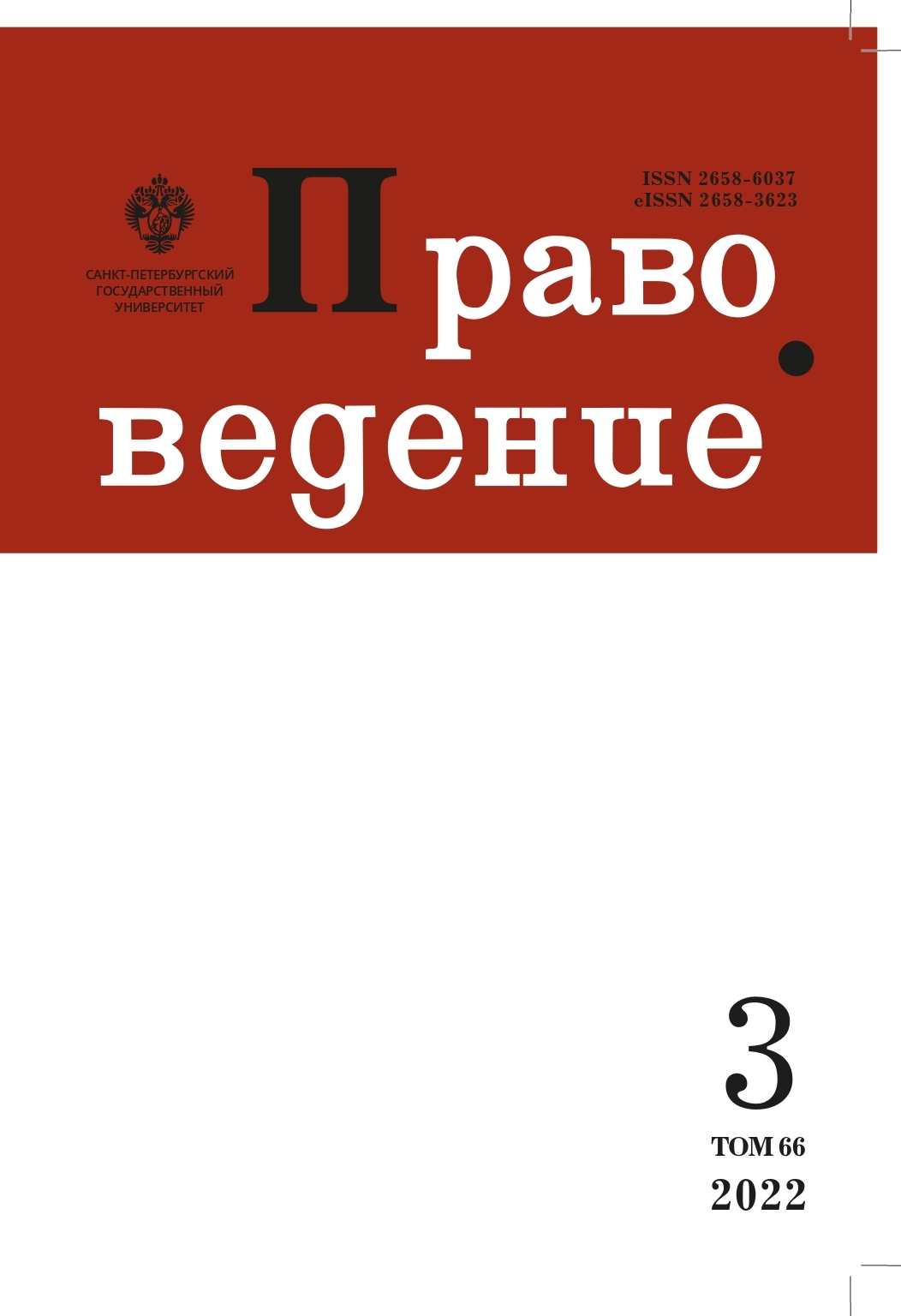Characteristics of the legal institution of co-ownership in Korea
DOI:
https://doi.org/10.21638/spbu25.2022.302Abstract
The present article examines the legal institution of co-ownership in the Civil Code of the Republic of Korea (hereinafter — CC RK), with the center of focus being on joint and collective ownership. Unfortunately the Civil Code was prepared rather hastily in the aftermath of more than three decades of colonial rule under the Japanese Empire and the Korean War of 1950–1953. As a result the CC RK has no lack of legislative errors and shortcomings. One of the more serious of these is the conflict of norms on joint ownership. Similar, if not almost identical, provisions on joint ownership exist in Part II (Real Rights) and Part III (Claims) of the CC RK. It is necessary to resolve this conflict of norms by repealing the problematic provision, i. e. Article 704 (Partnership-ownership of Partnership Property), as well as amending provision, i. e. paragraph 2 Article 271 (Partnership-ownership of Property), so as to have the latter conform better to the whole structure of the Civil Code in general. The norms on collective ownership pose no less of a problem for the application of the Civil Code. Although the legal concept of collective ownership was born and developed in German jurisprudence, the institution never made it into the German Civil Code. It was at the opposite side of the globe in Korea that collective ownership was recognized and stipulated in the Civil Code. However such legislation cannot be deemed rational. The concept of collective ownership does not reflect the characteristics of the Korean society and the various transactions that are conducted therein, and therefore lacks practicality and applicability. The sole reason for including norms of collective ownership in the first place was to regulate the particular co-ownership form of unregistered incorporations. It would have been more desirable to include the relevant provisions not in Part II (Real Rights) but Chapter III (Juristic Persons) of Part I (General Provisions), and recognize the grounds for the provisions on juristic persons to apply to unregistered incorporations, unless registration is deemed essential for the application of such norms. Aside from legislative recommendations for addressing the current problems of the Civil Code, the author of the present paper provides a critique of the legal thinking and doctrines on various aspects of co-ownership in Korea.
Keywords:
co-ownership, joint ownership, collective ownership, Civil Code, Republic of Korea, unregistered incorporations, juristic person
Downloads
References
Kang, Kwangmoon. 2018. A study on the legal nature of the collective ownership of land in China. Kangwon Law Review 53: 12–19. Seoul, Legal Research Institute of Kangwon University. (In Korean)
Kim, Daejung. 2012. Measures for amending the provisions of the Civil Code on collective ownership. Chungang Law Review 14 (4): 70. Seoul, Chungang Law Association. (In Korean)
Kim, Insub. 1995. A study on collective ownership. Perspectives on modern civil law. Jinju, LegalResearch Institute of Kyungsang University.
Kim, Sangyong Y. 2001. Amendment works of the Korean civil code (Property Law). Rechtspolitisches Forum 3. Trier: Institut für Rechtspolitik an der Universität Trier. Available at: https://nbnresolving.org/urn:nbn:de:0168-ssoar-261023 (accessed: 01.09.2021). (In Korean)
Kim, Younghee. 2019. Korea, Japan, France, Germany and the commons related regulations in each Civil Code. The Korean Journal of Legal History 59: 285–288. Seoul, Korean Society of Legal History. (In Korean)
Kim, Younghee. 2020. The enforced Civil Law era in Korea and the co-ownership theory. The Korean Journal of Civil Law 90: 33. Seoul, Korean Association of Civil Law. (In Korean)
Liin, Susann. 2020. Community of property — back to the roots. Juridica International 29: 15. Tartu, University of Tartu Press.
Lim, Sanghyeog. 2007. The legal capacity of non-juristic person incorpoarations. The Korean Journal of Civil Law 39 (1): 422–423. Seoul, Korean Association of Civil Law. (In Korean)
Myoung, Soonkoo. 2010. Chronicles of Civil Law. Part II. Seoul, Bobmoonsa. (In Korean)
Myoung, Soonkoo. 2011. The path of amending the norms on co-ownership: reforming joint and collective ownership. Anam Law Review 34: 335. Seoul, Legal Research Institute of Korea University. (In Korean)
Shim, Yigi. 1991. A study on land ownership in the late Chosun Dynasty: PhD Thesis in Law. Seoul, Seoul National University. (In Korean)
Downloads
Published
How to Cite
Issue
Section
License
Articles of "Pravovedenie" are open access distributed under the terms of the License Agreement with Saint Petersburg State University, which permits to the authors unrestricted distribution and self-archiving free of charge.




